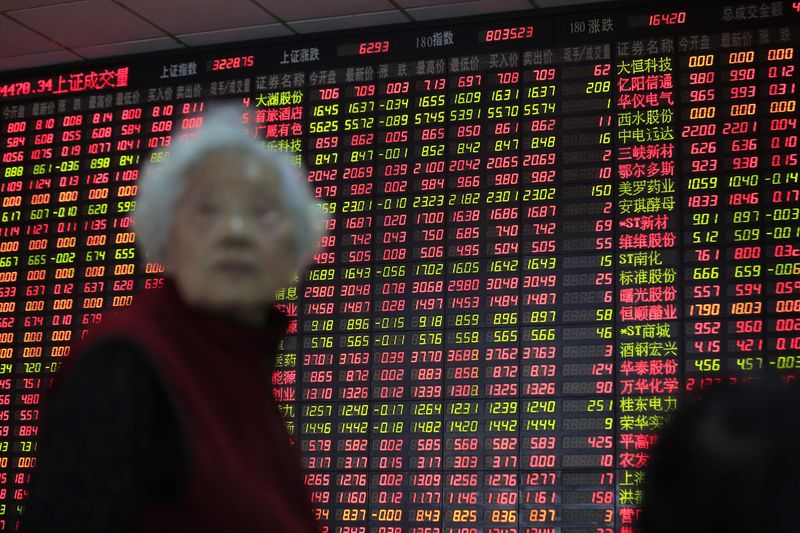Street Calls of the Week
Updates with India open, Alibaba and China tech moves
Investing.com-- Most Asian stocks retreated on Wednesday tracking overnight losses on Wall Street amid growing uncertainty over the path of U.S. interest rates, with technology shares losing more ground after a strong rally in recent weeks.
Weak purchasing managers index data from Japan and hotter-than-expected Australian consumer inflation data also weighed on sentiment.
Chinese stocks were an outlier, clocking mild gains on some optimism over more stimulus measures from Beijing. Chinese tech shares also recovered some ground after declining earlier this week.
But most Asian stocks retreated in tow of overnight losses on Wall Street, after Federal Reserve Chair Jerome Powell flagged increasing economic risks and uncertainty over interest rates. S&P 500 Futures were flat in Asian trade, with focus turning to a slew of key economic prints due this week.
Japan’s Nikkei dips on middling PMI data
Japan’s Nikkei 225 and TOPIX indexes fell slightly as trade resumed after a holiday on Tuesday.
PMI data showed Japan’s manufacturing sector shrank more than expected in September, while growth in the services sector moderated slightly. Overall Japanese business activity also grew at its slowest pace in four months.
The print highlighted continued weakness in Japanese manufacturing, especially as local industries such as automobiles and steel grapple with high U.S. trade tariffs.
But Japanese stocks still remained close to record highs hit last week, as increasing political uncertainty in the country spurred bets that interest rates will not rise in the near-term.
Australia’s ASX 200 sinks on hot CPI
Australia’s ASX 200 index was among the worst performers in Asian markets, sliding 1% as hotter-than-expected consumer price index inflation dented bets on more interest rate cuts by the Reserve Bank.
CPI data showed inflation rising 3% year-on-year in August, more than expectations of 2.9%. Underlying inflation also remained high, while core inflation– which excludes volatile items– remained well above the RBA’s 2% to 3% annual target.
Sticky inflation gives the RBA less impetus to cut interest rates, with the central bank also having flagged caution over future cuts due to sticky prices. The central bank cut rates by a total 75 basis points so far in 2025.
Hong Kong outperforms on tech gains; Alibaba rallies on AI cheer
Hong Kong’s Hang Seng index was an outlier in Asian markets, rising 0.9% on strength in local tech shares.
Alibaba Group led this trend, surging as much as 7% after the company unveiled its most powerful artificial intelligence model ever, while also vowing to ramp up its AI investment efforts.
Alibaba CEO Eddie Wu said the company will increase its previously committed $53 billion figure to AI investment, although he did not specify by just how much. Wu also flagged plans to apply AI in sectors beyond just chatbots, including virtual reality and smart driving.
Alibaba is at the forefront of China’s AI efforts, with the internet giant having spent billions of dollars over the past three years.
Gains in Alibaba helped push up broader Chinese tech stocks, which had fallen earlier this week. But the sector was sitting on stellar gains through August and September on heightened confidence in China’s AI prospects.
China’s Shanghai Shenzhen CSI 300 and Shanghai Composite indexes also outpaced their Asian peers on Wednesday, rising 0.4% to 0.5%.
Broader Asian stocks were less upbeat.
South Korea’s KOSPI fell 0.6%, and was the worst hit by losses in regional technology stocks. Memory chip makers Samsung Electronics Co Ltd (KS:005930) and SK Hynix Inc (KS:000660) fell 0.8% and 2.2%, respectively, following positive earnings from U.S. rival Micron Technology Inc (NASDAQ:MU).
Singapore’s Straits Times index shed 0.2%, while India’s Nifty 50 index fell 0.4%, extending losses amid little progress in trade talks between New Delhi and Washington.
The Nifty was on track to break below 25,000 points, amid heightened concerns over the impact of 50% U.S. trade tariffs on the Indian economy.
